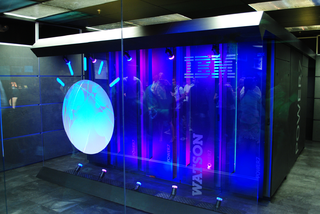A big problem in discussions of free will is language. One of the sticking points is often the way we talk about the meaning of will, or volition. The common intuition that we all have free will is based on the observation that most choices we make are in the context of there being many possible options. I could have eggs for breakfast, but I could also choose to do an endless number of other things. I have the freedom to decide which.
In explaining how a computer works, it would make
sense to say the computer "chooses" from a set of variables, according
to a predetermined set of parameters. When IBM's Watson computer famously competed and won against Jeopardy's best contestants, his responses were accompanied by the
relative probabilities his system gave alternate responses. Did Watson have the "freedom" to make other responses? No, he did not. He chose the response that made the most "sense" to him, based on predetermined parameters.
I
think it is important to describe will as the act of merely choosing between
competing options. In doing so, we make the notion of freedom
irrelevant, instead describing the fact that choices are dependent upon
predetermined parameters, ultimately arising from impulses outside of,
and prior to, our conscious awareness. Just as no one would describe
Watson's decisions as anything like "free", no one should describe our
choices as such either. The only difference is that our impulses are
infinitely more complex and (presently) unknowable.
Yet to the degree that those impulses are knowable, they are deterministic. That is, when analyzing why we make any particular choice, wherever we look we see a will that is dependent on predetermined parameters.

No comments:
Post a Comment